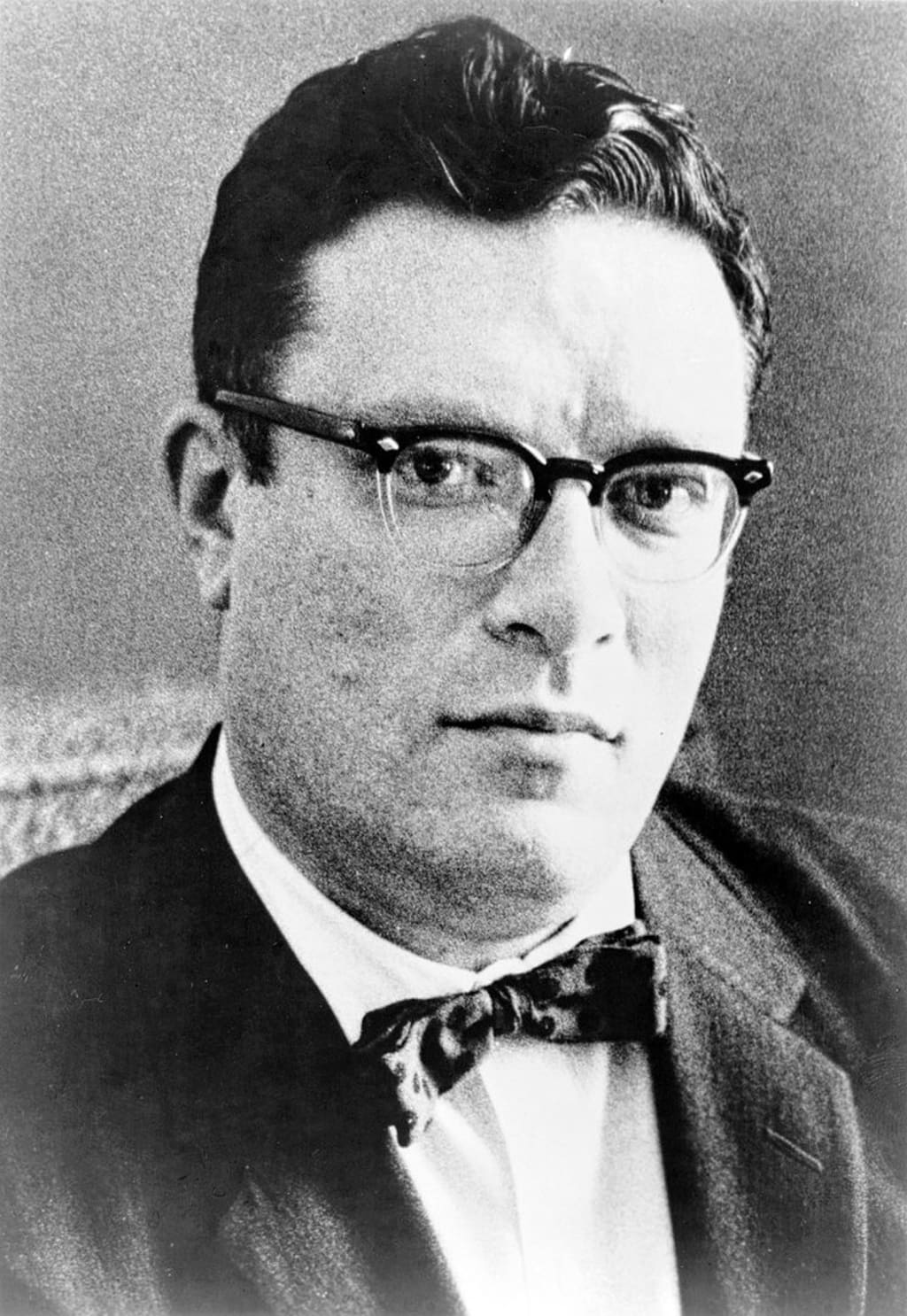Isaac Asimov Was Dead Right About Our Cult of Ignorance
“The strain of anti-intellectualism has been a constant thread winding its way through our political and cultural life, nurtured by the false notion that democracy means that ‘my ignorance is just as good as your knowledge.’” ― Isaac Asimov

Asimov said this in his rarely published 1980 Newsweek piece “The Cult of Ignorance.” Although it was a relatively short essay, it was meant as a warning against the dangers of a growing anti-intellectualism tide in the US, and in the post-Trump era, his words are more poignant today than when he wrote them.
The crux of Asimov’s essay is that the educated were being demonized instead of celebrated. Being intelligent meant you were an elitist, and knowing more than your neighbor meant you were an arrogant know-it-all who’s out of touch with the American people. He illustrated this idea with the example of Alabama politician George Wallace, who received raucous applause when he insulted one of his opponents by calling him the “pointy-headed-professor.” For Asimov, a biochemistry professor at Boston University, it must have been alarming to see a crowd of people cheer so enthusiastically for using a person’s education as a put-down.
Asimov also lamented that politicians avoided speaking above their audience’s level. He said that they would “speak the language of Shakespeare and Milton as ungrammatically as possible to avoid offending their audiences by appearing to have gone to school.” Adlai Stevenson lost to Dwight Eisenhower in 1956 because he allowed “intelligence and learning and wit to peep out of his speeches.” Eisenhower on the other hand “invented a version of the English language that was all his own.” For such a prolific science fiction author, Asimov must have certainly been aghast when he saw crowds gravitate towards a person that had so little grasp on language.
The cult of ignorance was only in its infancy during Asimov’s time. Since then, unfortunately, it’s gotten much worse.
Applauding Stupidity
If Asimov was shocked by the cult of ignorance in 1980, he would be disgusted with it today. For example, on January 3rd, 2021, Marjorie Taylor Greene assumed her seat in Congress, representing Georgia’s 14th district, but on February 4th, 2021, the House of Representatives voted to block her from sitting on committees. Why? Because she supports conspiracy theories like QAnon, 9/11 was fake, school shootings are false flag operations, and wildfires in California were started by a space laser controlled by the Rothschilds banking family. In fact, she is on video harassing David Hogg, a survivor of the Stoneman Douglas High School mass shooting. There’s also ample evidence calling for political opponents to be executed and making racist, Islamophobic, and anti-Semitic statements.
But during a hearing to decide Greene’s fate in Congress, she received a standing ovation from several of her colleagues in the Republican party. What exactly were they applauding? When Trump criticized Biden during the 2020 campaign by tweeting “he’ll listen to the scientists,” why did he receive hundreds of thousands of likes? When Lauren Boebert, another QAnon believing Congressional representative, tweeted the following, why did she receive well over 100K likes? Why are so many people supporting her conspiracy theories and science denying?
Why do the anti-vaxxer movement, flat-Earth society, and astrology still exist? Why was Sarah Palin applauded for criticizing Obama by describing him as a "constitutional law professor lecturing us from a lectern"? Why did Trump get 74 million votes after telling 30,000 lies in only 4 years?
Perhaps the greatest example is the fact that Dr. Anthony Fauci needed to have armed security guards for both him and his family because he told people to wear masks during the Covid-19 pandemic. Why? Why would a decades long public servant and public health expert be in danger?
The answer to all of these questions is that the cult of ignorance is strong, growing, and well-funded. And they’re proud of their membership.
The Unreasonable vs. the Reasonable
Among the many lessons we can derive from history, it’s clear that people don’t like being told they’re wrong. In 520 BCE, the Pythagoreans pushed Hippasus overboard for showing them that the square root of 2 is irrational. They believed only whole numbers existed; their motto was “all is number.” Socrates, one of the father’s of Western thought, was forced to drink hemlock, a commonly used poison at the time, because he did not believe in the Greek gods. In 425 CE, a mob of angry Christians tortured, murdered, and then burned Hypatia, a well-known philosopher and mathematician, for allegedly bewitching Orestes through her Satanic wiles.
The historical list of intelligent people that have been killed, imprisoned, censored, or persecuted for going against the grain is alarmingly robust. And it demonstrates that reasonable people are perpetually caught in a struggle against the unreasonable. When the reasonable tip the scales in their favor, society progresses. When the unreasonable get the upper hand, we regress. For example, in 5th century BCE Athens, Pericles ushered in a golden age that produced the philosophers Socrates and Plato, the historians Herodotus and Thucydides, the doctor Hippocrates, and of course the playwrights Sophocles, Aeschylus, and Euripides, all of whom made incalculable contributions to the advancement of society and are still studied today.
How did Pericles do this? His policies included expanding voting rights, stipends for those serving on a jury, reestablishing diplomatic relations with enemies especially Sparta, funding the arts such as adding to the Acropolis, fighting corruption in government, and funding education. He is remembered as a lover of philosophy and music and as a skeptic of supernatural phenomena. Thucydides gave him the title “the first citizen of Athens.”
Likewise, in 6th century BCE Babylon under Nebuchadnezzar II “schools and temples were plentiful and literacy, mathematics, the sciences, and craftsmanship flourished along with a tolerance of, and interest in, other gods of other faiths and the beliefs of other cultures.” Why? Because he understood the importance of math, science, art, and philosophy so he promoted it through funding, policies, and even example.
The same reasoning can be applied to the Roman Empire under Caesar Augustus, the Islamic Golden Age under Harun al-Rashid, the 4th Egyptian Dynasty, the Tang Dynasty in China, the American Century under presidents like Kennedy, among many other examples.
All of these demonstrate a pattern: when the reasonable are in charge and intellectual pursuits are given priority, society moves forward. When the unreasonable are in charge we stagnate or move backwards.
So Where Are We Now and Where Do We Go?
After the failed insurrection on January 6th, 2021, when armed Trump supporters stormed the Capitol building to interfere in the election, it has become abundantly clear how close we came to the unreasonable taking charge of the country. Not only did these people demonstrate fascist tendencies, they also were a product of a society in which pseudoscience runs rampant, facts have alternative versions, conspiracy theories go unchecked, science is defunded, artists are ridiculed, and experts are demonized. That is, the insurrectionists, QAnon followers, anti-vaxxers, flat-Earthers, creationists, etc. were produced by a society strangled by a cult of ignorance. Asimov was right.
So what can the reasonable do to stop the unreasonable? Asimov has the answer as well. In his “Foundation” series, he tells the story of Hari Seldon, who develops the scientific field of psychohistory, which can predict the behavior of large groups of people. He uses this field to predict the collapse of the galactic empire ruling the Milky Way, ushering in 30,000 years of darkness. To preserve humanity’s knowledge, he sets up two institutions run by scientists, one on each side of the galaxy. Their purpose is to weather the storm, to keep safe our scientific knowledge, and to spread it once the galaxy is ready again.
On the surface this is just another science fiction series (a really good one by the way), but it’s really Asimov’s warning and solution for us. He’s telling us 4 things. First, civilizations inevitably collapse because people are prone to war, corruption, mismanagement, greed, and ignorance. This is why the galactic empire collapsed, and this is why past civilizations collapsed. In fact, Asimov modeled the fall of the galactic empire after the fall of the Roman Empire. Second, the reasonable have limited power to stop the collapse of society and to prevent a dark age. Hari Seldon is able to control the collapse of the galactic empire and reduce the resulting dark age from 30,000 years to only 1,000. Likewise, in 1983, Soviet military officer Stanislav Petrov used reason to overcome fear as he watched 5 US nuclear missiles advancing on radar. Had he been unreasonable, he would have picked up the phone and informed high command, who quite possibly would have returned fire, resulting in mutually assured nuclear annihilation. Rather, he correctly reasoned that his computer was malfunctioning.
Third, the knowledge produced by a civilization needs to be protected during its decline and possible dark age. This is why Hari Seldon creates the two institutions, and this is why the US government created shadow libraries during the Cold War. And fourth, the next iteration of civilization relies on the knowledge that’s been protected. The new galactic empire needs the foundations and their archives, just as the European Renaissance was partly characterized by a rediscovery of ancient Greek and Latin texts, such as Euclid’s “Elements,” Lucretius’ “De rerum natura,” and Plato’s “Republic.”
Therefore, using Asimov as inspiration, we need to protect the knowledge we have and the people that create it. We need to stop book burners, science deniers, conspiracy theorists, and those that demonize the educated. If not, they will continue to erode our common heritage, the one thing that connects us to all previous civilizations, our ancestors’ gift to us and our gift to our progeny, and the thread that winds through all human history: knowledge.
So when someone tells me that Jesus coexisted with dinosaurs, that the Earth is flat, that it’s okay to ban books, that scientists are lying for funding, that the moon landing was faked, or that a high level government official is leaking information and prophecies about a global cabal of cannibalistic pedophiles anonymously online (QAnon), it’s a slap in the face to everyone that has not only pushed human knowledge forward but sacrificed their lives to do so. Every time Marjorie Taylor Greene is allowed to speak in front of the US Congress, she might as well be spitting on the graves of Aristotle and those that protected his work until civilization was ready for it again in roughly the 12th century. Every time Kent Hovind tries to change text books to say that the Earth is 6,000 years old, he might as well be a member of the crowd stoning Hypatia to death with roof shingles. Every time Alex Jones tells me that climate scientists are shills for the global elite who want to control the world, he might as well be pissing on Galileo’s monument in Florence’s Science Museum of La Specola.
Therefore, Asimov was right. He understood the fragility of civilization, the forces trying to destroy it, and the path forward. Listen to Asimov: protect knowledge and the knowledge creators because it and they are perpetually under attack by a coordinated, well-funded, angry cult of ignorance. They’ve taken down civilizations before, and we see them right now trying to do it again.
About the Creator
The Happy Neuron
Stimulating articles to make your brain happy. http://thehappyneuron.com/






Comments
There are no comments for this story
Be the first to respond and start the conversation.